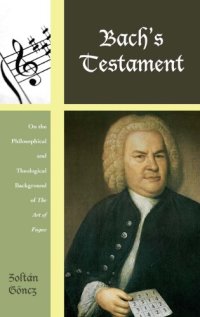
Ebook: Bach’s Testament: On the Philosophical and Theological Background of The Art of Fugue
Author: Zoltán Göncz
- Tags: History & Criticism, Music, Arts & Photography, Strings, Banjos, Cellos, Mandolins, Ukuleles, Violas, Violins, Instruments, Music, Arts & Photography, Classical, Chamber Music, Orchestral Songbooks, Musical Genres, Music, Arts & Photography
- Series: Contextual Bach Studies
- Year: 2012
- Publisher: Scarecrow Press
- Language: English
- pdf
Written late in his life, J. S. Bach’s The Art of Fugue has long been admired—in some quarters revered—as one of his masterworks. Its last movement, Contrapunctus 14, went unfinished, and the enigma of its incompleteness still preoccupies scholars and musical conductors alike. In 1881, Gustav Nottebohm discovered that the three subjects of the movement could be supplemented by a fourth. In 1993, Zoltán Göncz revealed that Bach had planned the passage that would join the four subjects in an entirely unique way. This section has not survived, but, as Göncz notes, it must have been ready in the earliest phase of composition since Bach had created the expositions of the first three subjects from its “disjointed” parts. Göncz then boldly took on the task of reconstructing the original “template” by putting together the once separate pieces.
In Bach’s Testament: On the Philosophical and Theological Background of The Art of Fugue, Göncz probes the philosophic-theological background of The Art of Fugue, revealing the special structures that supported the 1993 reconstruction. Bach’s Testament investigates the reconstruction’s metaphysical dimensions, focusing on the quadruple fugue. As a summary of Zoltán Göncz’s extensive research over many years, which resulted in the completion of the fugue, this work explores the complex combinatorial, philosophical and theological considerations that inform its structure. Bach’s Testament is ideally suited not only to Bach scholars and musicologists but also intellectual historians with particular interests in 18th-century religious and philosophical ideas.
In Bach’s Testament: On the Philosophical and Theological Background of The Art of Fugue, Göncz probes the philosophic-theological background of The Art of Fugue, revealing the special structures that supported the 1993 reconstruction. Bach’s Testament investigates the reconstruction’s metaphysical dimensions, focusing on the quadruple fugue. As a summary of Zoltán Göncz’s extensive research over many years, which resulted in the completion of the fugue, this work explores the complex combinatorial, philosophical and theological considerations that inform its structure. Bach’s Testament is ideally suited not only to Bach scholars and musicologists but also intellectual historians with particular interests in 18th-century religious and philosophical ideas.
Download the book Bach’s Testament: On the Philosophical and Theological Background of The Art of Fugue for free or read online
Continue reading on any device:

Last viewed books
Related books
{related-news}
Comments (0)